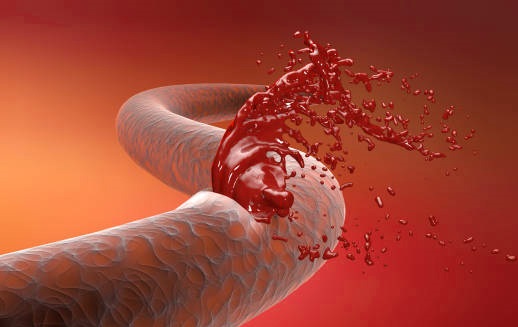Nikhil Prasad Fact checked by:Thailand Medical News Team Sep 22, 2025 4 months, 3 weeks, 1 day, 9 hours, 23 minutes ago
Medical News: A Potential Breakthrough in Vascular Leakage Research
Scientists at the University of Oklahoma have uncovered compelling evidence that the protein CD82 plays a central role in causing blood vessels to leak during severe inflammation—a process that can trigger organ failure and death in conditions like sepsis, COVID-19, and acute respiratory distress syndrome. The study findings covered in this
Medical News report, offer hope for treatments that could reduce or prevent fatal outcomes of systemic inflammation.
 CD82 Protein May Hold Key to Deadly Blood Vessel Leakage
What the Study Found
CD82 Protein May Hold Key to Deadly Blood Vessel Leakage
What the Study Found
Inflammation often disrupts the tight barrier function of blood vessels, allowing fluid and proteins to seep into surrounding tissues. This leakage is not just a side-effect but a key driver of dangerous complications in multi-organ failure. Researchers explored how CD82, a type of tetraspanin protein, influences this process. They demonstrated that when CD82 is removed or "ablated" from blood vessel cells in animal models, vascular leakage in response to inflammatory triggers is significantly reduced. One of the interesting insights is that the mechanism involves what the researchers call “accessible cholesterol” on the surface of vascular cells. CD82 interacts with this accessible cholesterol to trigger intracellular signaling that destabilizes vessel walls, increasing permeability. Importantly, by using statins—medications widely known for lowering cholesterol—the team showed that reducing the pool of accessible cholesterol helps to reinforce vessel integrity and reduces leakage.
Experimental Details and Model Systems
The study used animal models, including mice, to observe what happens when CD82 function is removed in the context of inflammation. In one experiment, mice infected with SARS-CoV-2 via the nose showed heavy infiltration of leukocytes in lung tissue; in CD82 knock-out mice this infiltration was much reduced, corresponding to less vascular leakage. The research quantified leukocyte infiltration and used immune staining, among other histological methods. They also studied the behavior of small cholesterol pools accessible on the cell surface, distinguishing them from total cholesterol, and examined how CD82-cholesterol interactions alter the balance of GTPase signaling inside cells. These GTPases are molecular switches that influence cell shape, junction integrity, and permeability.
Implications for Therapy
The new research suggests two promising therapeutic angles. First is targeting CD82 itself. If drugs or biologics can reduce or modulate the activity or expression of CD82, vascular leakage might be prevented in severe inflammatory states. Second is repurposing statins. Because statins are already approved drugs that reduce cholesterol levels, including accessible cholesterol pools on cell membranes, they may help stabilize vascular barriers in patients with systemic inflammation. The study’s observation that statins decrease leakage in preclinical models is especially encouraging.
&a
mp;nbsp;
Limits and Next Steps
While the findings are strong, the authors emphasize that the work is preclinical—all experiments thus far have been in animal or cell models, not in human patients. More studies will be needed to confirm safety, effective dosing, and actual benefits in human inflammatory diseases. Also, the exact dynamics of cholesterol accessibility in human vascular endothelium during disease need further clarification.
Conclusion
This study sheds light on the crucial role of CD82 in promoting blood vessel leakage during inflammation. By interacting with accessible cholesterol on endothelial cells, CD82 triggers signaling pathways that compromise vascular integrity, leading to leakage of fluid and proteins—a key step toward organ damage in severe systemic inflammatory states. Ablation of CD82 in experimental models dramatically reduces leakage, and the use of statins to lower the cholesterol that interacts with CD82 shows promise. These findings pave a pathway toward new or repurposed treatments aimed at preventing multi-organ failure in patients suffering from sepsis, COVID-19, and similar conditions. While human clinical trials are still needed, targeting CD82 and regulating cholesterol accessibility could become a novel strategy in vascular medicine.
The study findings were published in the peer reviewed journal: Nature Cardiovascular Research
https://www.nature.com/articles/s44161-025-00686-2
For the latest on treating or preventing vascular damage and leakage, keep on logging to Thailand
Medical News.
Read Also:
https://www.thailandmedical.news/news/navigating-vascular-complications-of-covid-19-an-evolving-understanding-and-the-road-ahead
https://www.thailandmedical.news/news/alarming-discovery-that-asymptomatic-covid-19-infections-causes-hidden-blood-vessel-and-red-blood-cell-changes
https://www.thailandmedical.news/news/polish-study-finds-that-adenosine-deaminase-1-or-ada1-hijacked-by-covid-19-may-be-fueling-long-term-vascular-damage
